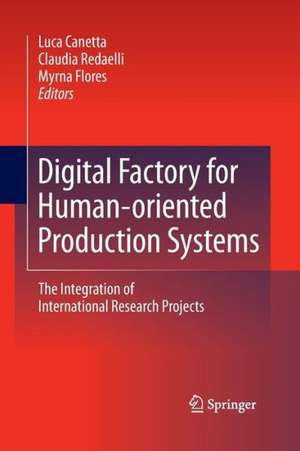Digital Factory for Human-oriented Production Systems: The Integration of International Research Projects
Editat de Luca Canetta, Claudia Redaelli, Myrna Floresen Limba Engleză Paperback – 26 sep 2014
Digital Factory for Human-oriented Production Systems investigates the impact of the digital factory through a consideration of the entire product/process lifecycle, and the broad network of product engineering, material and component suppliers, manufacturing equipment suppliers, and customers involved in current and next generation manufacturing. It covers the utilization and integration of:
- human body ergonomics models;
- production system discrete event simulation;
- 3D/virtual and augmented reality visualization;
- collaborative design tools;
- automatic data capture; and
- knowledge management systems based on semantic web ontologies integrated by a continuous data management.
| Toate formatele și edițiile | Preț | Express |
|---|---|---|
| Paperback (1) | 786.96 lei 38-44 zile | |
| SPRINGER LONDON – 26 sep 2014 | 786.96 lei 38-44 zile | |
| Hardback (1) | 952.09 lei 6-8 săpt. | |
| SPRINGER LONDON – 10 iul 2011 | 952.09 lei 6-8 săpt. |
Preț: 786.96 lei
Preț vechi: 1035.48 lei
-24% Nou
Puncte Express: 1180
Preț estimativ în valută:
150.60€ • 156.65$ • 124.33£
150.60€ • 156.65$ • 124.33£
Carte tipărită la comandă
Livrare economică 10-16 aprilie
Preluare comenzi: 021 569.72.76
Specificații
ISBN-13: 9781447158479
ISBN-10: 1447158474
Pagini: 328
Ilustrații: XVI, 309 p.
Dimensiuni: 155 x 235 x 17 mm
Greutate: 0.46 kg
Ediția:2011
Editura: SPRINGER LONDON
Colecția Springer
Locul publicării:London, United Kingdom
ISBN-10: 1447158474
Pagini: 328
Ilustrații: XVI, 309 p.
Dimensiuni: 155 x 235 x 17 mm
Greutate: 0.46 kg
Ediția:2011
Editura: SPRINGER LONDON
Colecția Springer
Locul publicării:London, United Kingdom
Public țintă
ResearchCuprins
1. Flow for Presence Questionnaire.- 2. Ergonomics Methods and the Digital Factory.- 3. A Web-based Platform for Collaborative Product Design, Review and Evaluation.- 4. Integration Framework and PPR+H Hub for DiFac.- 5. RFID-ERP Key Data Integration Challenges.- 6. A versatile ERP-RFID Interfacing Scheme.- 7. Business Process Management (BPM) and Web 2.0 as Key Enablers for the Future Knowledge Based Digital Factory.- 8. Real-time Collaborative Information Management in Enterprises.- 9. The Intelligent Web.- 10. Human Body Modeling.- 11. Flexible Integration of VR-based Tools and Simulation Applications for the Planning and Optimization of Factories and Manufacturing Processes.- 12. GIOVE Virtual Factory: A New Viewer for a More Immersive Role of the User During Factory Design.- 13. Augmented Reality for Remote Maintenance.- 14. Discrete Event Simulation of Production System with Web-based Support.
Notă biografică
Dr Luca Canetta is a researcher and lecturer at the Scuola Universitaria Professionale, Svizzera Italiana (SUPSI), in the Department of Innovative Technology, ICMSI. He holds a Laurea in Industrial Engineering from the University of Bergamo (1999) and a PhD in Demand Modelling and Operations Management from the Swiss Federal Institute of Technology at Lausanne (EPFL) (2009). At SUPSI it is responsible of various courses in Operations Managements taught at the Precision Manufacturing Master of Science, the Industrial Engineering Bachelor of Science and various Master of Advanced Studies (Industrial Engineering and Operations; Sustainable Pharmaceutical Operations and Engineering; Reliability Maintenance and Safety in collaboration with Politecnico of Torino). He was invited lecturer for various master of science courses and postgraduate courses (Master of Science in Business Information Systems at the HEC Lausanne, Executive Master Program in Management of Logistical Systems (IML) at the EPFL, Executive MBA in Management of Technology at the EPFL). His main research interests are production system robustness, customer behaviour analysis, modelling of market demand scenarios and sustainable mass customisation. He is the author of many journal and conference articles.
Since 2002, Dr Claudia Redaelli has worked for ITIA-CNR, Institute of Industrial Technology and Automation, National Research Council of Italy as dissemination and communication manager and human factors specialist. She holds a university degree in Foreign Languages and Literature with a specialization in Cross-Cultural Psychology, a Master’s in Information Science for those who graduated in liberal arts. As dissemination manager in different European and IMS projects, she develops the dissemination strategies and plans the communication both inside the consortium and for a more general audience with help from institutional websites, events and public presentations of theproject results. For some years she studied the impact of virtual reality applications, evaluating their relevance in the industrial context especially focusing on Presence and cognition. Similar approaches have been applied, in collaboration with a research group at the Statale di Milano University at the pre-clinic science department “LITA di Vialba”, for understanding patient reactions to innovative rehabilitation techniques and devices. Now she is actively collaborating in different research projects linking psychological approaches with technologies. She is the author of many published articles presented at international conferences.
Dr Myrna Flores obtained her Mechanical Engineering degree in 1996 and her Master’s in Science in Manufacturing Systems in 1999; both from the Instituto Tecnólogico y de Estudios Superiores de Monterrey in Mexico. She attended a four-month postgraduate course on Technologies and Sustainable Development at the Indian Institute of Technology in Madras, India, in 2005. She finished her PhD studies in Management and Industrial Engineering at the Politecnico di Milano in May 2006. Currently she works as a researcher at the CEMEX Global Center for Technology and Innovation in Switzerland, where she leads the Business Process Research & Networking area under Processes and IT, managing a portfolio of research projects in business process management, collaborative networks, knowledge management, sustainable innovation and end-to-end solutions. Previously she worked for six years at the CIM Institute for Sustainable Innovation (ICIMSI) in Switzerland where she collaborated on several international projects funded by the Swiss Innovation Promotion Agency (CTI) and Intelligent Manufacturing Systems. She also worked for General Electric (1999 – 2001) as an R&D engineer in the Corporate Research and Development Centre developing and managing six sigma green belt projects to optimize manufacturing and logisticsoperations in global supply chains, developing discrete event simulation models in the Manufacturing Global Solutions Research Team. In General Electric she also led a one year project to implement e-business solutions in more than 2000 suppliers in the USA, leading a team of 20 people. She is the author of more than 30 published articles presented at international conferences.
Since 2002, Dr Claudia Redaelli has worked for ITIA-CNR, Institute of Industrial Technology and Automation, National Research Council of Italy as dissemination and communication manager and human factors specialist. She holds a university degree in Foreign Languages and Literature with a specialization in Cross-Cultural Psychology, a Master’s in Information Science for those who graduated in liberal arts. As dissemination manager in different European and IMS projects, she develops the dissemination strategies and plans the communication both inside the consortium and for a more general audience with help from institutional websites, events and public presentations of theproject results. For some years she studied the impact of virtual reality applications, evaluating their relevance in the industrial context especially focusing on Presence and cognition. Similar approaches have been applied, in collaboration with a research group at the Statale di Milano University at the pre-clinic science department “LITA di Vialba”, for understanding patient reactions to innovative rehabilitation techniques and devices. Now she is actively collaborating in different research projects linking psychological approaches with technologies. She is the author of many published articles presented at international conferences.
Dr Myrna Flores obtained her Mechanical Engineering degree in 1996 and her Master’s in Science in Manufacturing Systems in 1999; both from the Instituto Tecnólogico y de Estudios Superiores de Monterrey in Mexico. She attended a four-month postgraduate course on Technologies and Sustainable Development at the Indian Institute of Technology in Madras, India, in 2005. She finished her PhD studies in Management and Industrial Engineering at the Politecnico di Milano in May 2006. Currently she works as a researcher at the CEMEX Global Center for Technology and Innovation in Switzerland, where she leads the Business Process Research & Networking area under Processes and IT, managing a portfolio of research projects in business process management, collaborative networks, knowledge management, sustainable innovation and end-to-end solutions. Previously she worked for six years at the CIM Institute for Sustainable Innovation (ICIMSI) in Switzerland where she collaborated on several international projects funded by the Swiss Innovation Promotion Agency (CTI) and Intelligent Manufacturing Systems. She also worked for General Electric (1999 – 2001) as an R&D engineer in the Corporate Research and Development Centre developing and managing six sigma green belt projects to optimize manufacturing and logisticsoperations in global supply chains, developing discrete event simulation models in the Manufacturing Global Solutions Research Team. In General Electric she also led a one year project to implement e-business solutions in more than 2000 suppliers in the USA, leading a team of 20 people. She is the author of more than 30 published articles presented at international conferences.
Textul de pe ultima copertă
Digital factory is a comprehensive approach providing methodologies, models and tools that support manufacturing enterprises in the rearrangement of their organizational structures to deal with expected changes in manufacturing processes and markets.
Digital Factory for Human-oriented Production Systems investigates the impact of the digital factory through a consideration of the entire product/process lifecycle, and the broad network of product engineering, material and component suppliers, manufacturing equipment suppliers, and customers involved in current and next generation manufacturing. It covers the utilization and integration of:
Digital Factory for Human-oriented Production Systems investigates the impact of the digital factory through a consideration of the entire product/process lifecycle, and the broad network of product engineering, material and component suppliers, manufacturing equipment suppliers, and customers involved in current and next generation manufacturing. It covers the utilization and integration of:
- human body ergonomics models;
- production system discrete event simulation;
- 3D/virtual and augmented reality visualization;
- collaborative design tools;
- automatic data capture; and
- knowledge management systems based on semantic web ontologies integrated by a continuous data management.
Caracteristici
Provides integrated approach to manufacturing Based on interdisciplinary research from across the globe Proposes methodologies and technologies that have been developed in order to facilitate their adoption by SMEs/SMBs












